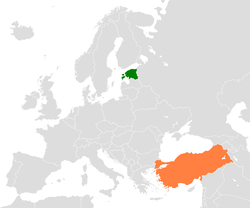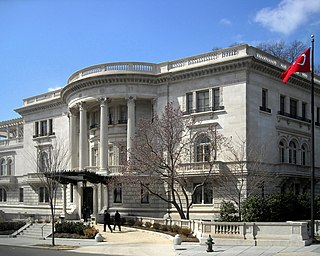
Physically bridging Europe and Asia and being above Africa, Turkey is a secular country that has historically pursued a Western-oriented foreign policy. To this end, Turkey uses its global diplomatic network—the third most extensive—of 252 diplomatic and consular missions.

Croatia and Turkey established diplomatic relations in 1992. Turkey recognized independent Croatia in 1991. Croatia has an embassy in Ankara and an consulate-general in Istanbul and an 2 honorary consulates in Antalya and İzmir. Turkey has an embassy in Zagreb. Both nations are members of the NATO and OSCE and COE. Croatia is an EU member and Turkey is an EU candidate. Croatia supports Turkey's accession negotiations to the EU, although negotiations have now been suspended.

Malta–Turkey relations are foreign relations between Malta and Turkey. Malta is represented in Turkey through its embassy in Ankara. Malta and its consulate–general in Istanbul. Turkey is represented in Malta through its embassy in Valletta. Both countries are full members of the Council of Europe, the World Trade Organization and the Union for the Mediterranean. Turkey is a member of NATO. Malta instead is not a member of NATO.

Hungary–Turkey relations are the bilateral relations between Hungary and Turkey. Both countries are full members of the Council of Europe, the OECD, the NATO, the OSCE and the WTO. Also Hungary is an EU member and Turkey is an EU candidate. Hungary supports Turkey's accession negotiations to the EU, although negotiations have now been suspended. Hungary has observer status in the Organization of Turkic States, in which Turkey is a full member.

Belgian–Turkish relations are foreign relations between Belgium and Turkey. Belgium has an embassy in Ankara, a consulate–general in Istanbul and two consulates in Antalya and İzmir. Turkey has an embassy in Brussels and a consulate–general in Antwerp.

North Macedonia–Turkey relations are the bilateral relations between North Macedonia and Turkey. Both countries are full members of the BSCE and COE and of the NATO. North Macedonia has an embassy in Ankara and a Consulate General in Istanbul. Turkey has an embassy in Skopje.

Foreign relations exist between Bahrain and Turkey. Turkey's historic relationship with Bahrain has wavered between indifference and courtship, but the constant has been a layer of mistrust emanating from both ends that appears to have been set aside in 2002 when the new Turkish government reversed the status quo and embraced a policy of engagement that has successfully catapulted the country to becoming a leading economic player in the Bahrain.

Turkey was the first country to recognize the independence of Belarus. Diplomatic relations were established on 25 March 1992. Turkey has an embassy in Minsk. Belarus has an embassy in Ankara, a Consulate General in Istanbul.

Tajik–Turkish relations are friendly and cooperative and underlined with a legal basis of more than 30 treaties and protocols which have been signed between two countries since 1991.

Diplomatic relations between Turkey and Venezuela were established in 1950.

Colombia–Turkey relations are foreign relations between Colombia and Turkey. Diplomatic relations between the two countries were established in 1959. Turkey has an embassy in Bogotá while Colombia has an embassy in Ankara.

Bolivia–Turkey relations are foreign relations between Bolivia and Turkey. Turkey has had an embassy in La Paz since February 14, 2018. In September 2022, Bolivia opened an embassy in Ankara.
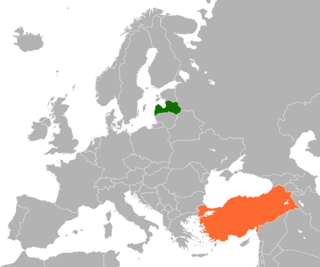
Latvia–Turkey relations are the foreign relations between Latvia and Turkey. Both countries are members of NATO and OSCE and COE.

Chad–Turkey relations are the foreign relations between Chad and Turkey. Neither country had a resident embassy before a Turkish Embassy opened in N’Djamena on 1 March 2013, and a Chadian one in Ankara on 10 December 2014. Turkey recognized the independence of Chad on August 11, 1960 and established diplomatic relations on January 27, 1960.

Thailand–Turkey relations are the modern foreign relations between Thailand and Turkey. The cordial relations between the two countries date back to 1958, when the two countries established diplomatic relations. Shortly after, Turkey set up its embassy in Bangkok. Thailand reciprocated by opening its embassy in 1972. However, even during the era of the Ottoman Empire, there had been historical contacts between the Empire and Siam at the time -- most notably the visit of Prince Damrong, younger brother of King Chulalongkorn the Great of Siam, to Istanbul as the royal guest of Sultan Abdul Hamid II in 1891.

Slovakia–Turkey relations are the foreign relations between Slovakia and Turkey. In 1993, Turkey was one of the first states to formally recognize both the Slovakia and Czech Republic as separate, and sovereign states after the dissolution. Diplomatic relations and the Turkish Embassy in Bratislava were established on January 4, 1993. Before the 1990s split, Turkey held close but also tense relations with Czechoslovakia, specifically during the Cold War due to NATO and the rest of Europe pushing and supporting anti-communist sentiment and approach for its members, such as Turkey, towards Eastern Bloc countries of which Czechoslovakia was a part of.
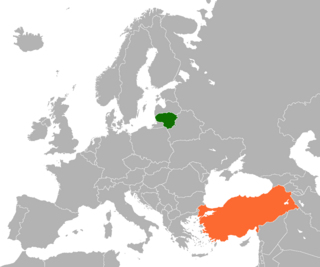
Lithuania–Turkey relations are the foreign relations between Lithuania and Turkey. Turkey recognized Lithuania on July 28, 1922, and diplomatic relations were established on the same day. The Turkish ambassador to Estonia in Tallinn was also accredited to Lithuania. Following USSR occupation and annexation of Estonia, Latvia and Lithuania, the Turkish embassy in Tallinn closed on September 5, 1940. Turkey, however, never recognized the Soviet annexation of Lithuania.

Mauritius–Turkey relations are the foreign relations between Mauritius and Turkey. The Turkish ambassador to Madagascar is also accredited to Mauritius. Turkey also has an Honorary Consulate-General in Port-Louis. Mauritius's ambassador in Berlin is also accredited to Turkey.

Latvia–Uzbekistan relations are bilateral relations between Latvia and Uzbekistan. Diplomatic relations between the two countries were established on 3 November 1992. Both countries were Soviet socialist republic of the USSR from 1940 until 1991. Latvia has an embassy in Tashkent which is also accredited to Tajikistan and Turkmenistan, and in which Estonia issues visas to Uzbeks, and Uzbekistan has an embassy in Riga which is also accredited to Lithuania. Both countries are full members of the Organization for Security and Co-operation in Europe.
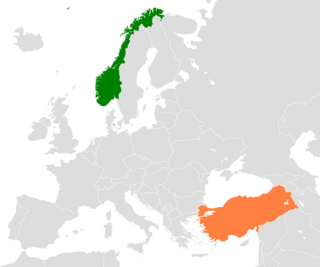
Norway–Turkey relations are foreign relations between Norway and Turkey. The bilateral relations were established in 1926.
